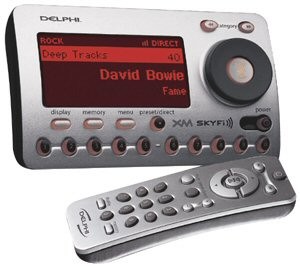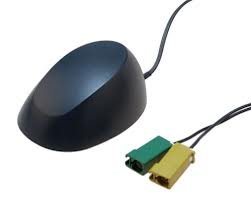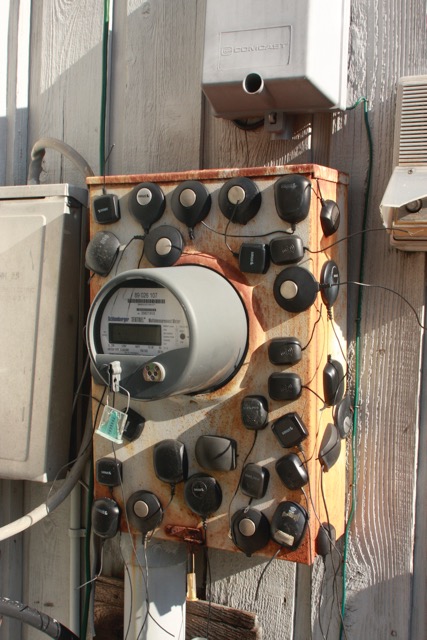From Love to Hate
Let me just get it right out there in the open – I really don’t like SiriusXM for a number of reasons – but I didn’t always feel that way.
When the service was first announced in summer 2001, we were all very excited at our car audio shop. What a cool idea! Digital radio, no static, a variety of music genres, news, talk, and comedy? And we get free demo subscriptions for selling it?? Even better.
To really understand the excitement we experienced, you have to think back to a time when the iPod was still a relatively new gadget that came loaded with limitations. Even if you did have the newfangled MP3 player, you still had very limited options for connecting it and playing it through your car stereo. Most car stereo’s were not capable of playing an iPod unless you wired it through an AUX jack and if you did do that, you were lucky if it stayed charged for more than 60 minutes.

I’m just trying to remind you all that when satellite radio first launched, digital music was a pretty new concept. It was a great way to have access to a variety of digital music in your car without worrying about transferring music from your computer onto a device and trying to figure out how to keep the dang thing charged up long enough to play.
As an early adopter of the product and service, I have seen satellite radio grow and change a lot over the past 14 years. Sadly, at this point, I see no need for the product and I honestly cringe when a customer asks for it. I cannot stand selling and installing it for the reasons outlined ahead.
Siriusly Compressed
When satellite radio first came out it sounded pretty good. It wasn’t exactly CD quality, but it was still pretty good. However, as the competition heated up between Sirius and XM, the compression increased. Bandwidth was squeezed and each provider added more channels in an attempt to be more attractive than the other. When service first started each provider had around 120 channels to choose from (from recollection – I can’t find an original channel line up). Now the combined SiriusXM offers more than 175 channels.
So how badly is it compressed? How about 32 kbps (kilo bits per second). Let me put that into perspective for you. When you buy a CD in the store (I think they still exist) the CD relays 1411 kbps of information. So let’s do the math.
Okay, so 32 divided by 1411 equals about .02 or we can call it 2%. You’re listening to 2% of the original information. What does that mean? You lose:
- Detail
- Nuance
- Depth
- Richness
- Clarity
- Body
- Fullness
- Warmth
- 98% of the original audible information the artist intended to relay
That is why satellite radio sounds so tinny and hollow. That is why it has no bass, no warmth, no punch. Don’t get me wrong – It’s fine for news, talk, sports and entertainment, but PLEASE, for the love of God, do not listen to SiriusXM for music and then complain to me that it sounds bad. This is why it sounds bad. You can’t make 32 kbps sound good, you just can’t. It’s going to sound bad. Why would you want to listen to something that sounds bad? I just don’t get it.
Inconsistent Audio Quality
You would think SiriusXM would sound just as crappy from vehicle to vehicle and stereo to stereo, but it doesn’t. The level of crappiness varies based on hardware. Your SiriusXM in your Chevy Tahoe will not sound the same as your SiriusXM in your Toyota Camry or your SiriusXM connected to your aftermarket Alpine stereo.
You see, some manufacturers utilize internal equalization adjustments within their stereos that are source dependent. This is a nice feature. They do this so there is no large drop in output and quality when switching from various audio sources like CD, USB, Satellite Radio and FM/AM. In reality, all of these sources will have different quality, different bandwidth and different compression rate. In order for the driver to have a more pleasant experience, these stereos will internally adjust audio levels in order to provide a more seamless listening transition between sources.
Some aftermarket stereos offer this feature called Source Level Adjust or SLA. Some even have different equalization memory per source. This allows users with an aftermarket stereo to emulate the same kind of smooth transition between sources as described in the scenario above.
On the other hand, some stereos (stock or aftermarket) have none of these features. In that case, when you switch between your iPod or CD or FM/AM tuner and then over to SiriusXM, you will notice how compressed, tinny and hollow it sounds in comparison to your other higher quality audio sources.
Unfortunately, even with an advanced equalizer and source level adjust, there is still only so much you can do to help 32 kbps. It will still sound bad compared to a song downloaded from iTunes in Apple Lossless format. It just won’t sound as bad with features like source level adjust and source independent equalization. To the untrained ear, you might not realize this. That is until you get into a car without these features and holy hell, you’re pissed and wondering why it sounds so bad in your new Toyota FJ Cruiser compared to the Chevy Tahoe you just traded in.
My point is if you think it sounds good in one car, that doesn’t really mean anything because it’s acoustical trickery. At some point in time you will encounter SiriusXM in it’s raw state. And when you hear that A/B comparison as you switch between your FM radio and your SiriusXM radio (without any internal equalization or adjustment) you will be disappointed. That is the true nature of the source.
This has been a very frustrating experience for many customers. I’ve had people march into my shop looking for answers that they can take to their dealer after buying a new vehicle. These customers are convinced they have a bad tuner and believe the dealer needs to put in a new one. Why? Because they had it in their last 3 Nissan’s and always loved it, but cannot believe how bad it sounds in their brand new Chevy Traverse. I have to gently explain to them how it works, why SiriusXM sucks and how there is really nothing they can do about it.
All of these examples I am giving you are from real customer experiences. It’s all over the place. There is no consistency in what each manufacturer does within their stereo, but the tuner is always relaying the same information.
Inconsistent Signal Reception
You would think there is one service provider so there is one type of tuner and one type of antenna. Unfortunately that’s not the case and this can lead to very inconsistent signal quality from vehicle to vehicle and stereo to stereo.
At the moment, the universal aftermarket SiriusXM tuner is the SXV300 made by Audiovox. This is a combination SiriusXM tuner which works off of satellites from both providers. This is really helpful for coverage. There was a time that I had service from both providers in my own vehicle. During this time, I found that wherever XM cut out – Sirius would not and wherever Sirius would cut out – XM would not. So it is nice that these newer tuners have better signal coverage. However, I don’t believe they work off of repeaters like the older XM receivers and antennas used to.
The antennas that worked off of repeaters were awesome. You could travel into New York City and go under tunnels, past tall buildings and the signal didn’t cut out because it was working off of both satellite and local area repeaters. These antennas typically had two connections. One was satellite based and one was terrestrial like the connection shown here:

The newer style antennas are just a single satellite connection. However there are still some vehicles that have this style antenna and still operate off both terrestrial and satellite signal. What does this all mean for you the subscriber? You will have varying and inconsistent satellite coverage depending on what equipment your vehicle comes with.
In my experience, the factory Toyota/Lexus tuners and antennas seems to have the worst reception. I believe they are have no buffer and work off of XM satellites only. I seem to get the most complaints from customers with Toyotas and Lexus factory Satellite radio equipment. These customers can at least install one of the newer combo tuners with an interface from VAIS Technology that will pull signal from both satellites.
Up here in New England, we have seasonal coverage issues. I have customers that love their satellite radio in the winter, when the trees are bare, but as soon as the leaves grow in, coverage becomes spotty and inconsistent. We have a lot of windy tree covered roads up here which can put a Sirius damper on your SiriusXM listening experience. I bet the engineers didn’t really think of that when they decided to lose the terrestrial connector.
Poor Equipment Quality
So check this out – the SiriusXM tuner SXV300 sells for around $50 and it comes with a 90 day warranty. You know how much an installer is going to charge you to put that in your car? At our shop we charge one hour labor to install this tuner to a SiriusXM ready vehicle/stereo. One hour with shop parts equals $86.63. So what happens in a year when the flimsy antenna craps out and needs replacing?

It will end up in our SiriusXM antenna resting place and you’ll be looking at a bill for $120+ to replace it. That’s $30 for the antenna (another 90 day warranty), another hour labor to install it and local sales tax. And when you live in an area like New England with extreme temperature/weather swings between Summer and Winter you can expect to replace your SiriusXM antenna at least once during your life as a subscriber. Keep in mind, SiriusXM themselves only expect it to last at least 90 days.
Non Existent Incompetent Customer Service
If you happen to have a lifetime subscription that needs transferring, be forewarned they will screw it up. I have had nearly all my lifetime subscriber customers experience this frustration. As an early supporter, they bought in to a lifetime subscription years ago when Sirius and XM were offering these. These customers shelled out over $500 when each provider was only charging around $10 a month for service. They figured they would always have the service and it would pay for itself in 5 years.
However, most lifetime subscriptions included lots of fine print such as only being allotted up to 3 total transfers (should your tuner fail or you decide to buy a new car). Additionally, you may be charged $75 per transfer. Once you get past all that and pay your transfer fee to get your lifetime service swapped, you will experience one of two things. Either you will not have your full channel line up or you will keep losing your channels as though it was never activated (preview channel and channel 0 will work).
When you call SiriusXM they will insist it is a hardware issue and want you to have the brand new tuner swapped out. Don’t drink the koolaid. It’s not a hardware issue, it’s a programming issue and it will take you hours to find a customer service rep with half a brain cell that knows this and can complete the transfer properly.
Virtually No Profit Margin
I don’t know about you, but I don’t work for free and I don’t expect anyone else to either. Apparently, SiriusXM expects its retailers to and for that they suck. As a retailer, there is no mark up in this stuff – like none. In fact, many SiriusXM products are below wholesale on Amazon Prime by a few bucks. Sad, but true.
When the service first came out, hardware was being manufactured by car stereo manufacturers like Pioneer, Kenwood and Alpine. These car stereo companies are in business for profit like us. They understand that we, as retailers, need to sell and install profitable items in order to make a living. So it made sense that these manufacturers sold satellite radio product to us at a wholesale price with a manufacturer suggested retail price that actually included a profit margin. How thoughtful!
Additionally, as a supporter and retailer of Sirius and XM products we were given a Sirius and XM dealer account number. We even received a commission for each satellite radio we activated. It wasn’t huge, but it was something. I would could call it a “Thank you for supporting our growing company” spiff. Imagine this: Sirius and XM also provided us with a dealer support line so activating a customer’s radio was easy. Transfers were no problem. We always reached a customer service rep in a timely manner that could understand what we were trying to do and take care of it the first time we explained it.
Now? Ha! None of that. There is virtually no profit margin in the product. As a consumer, you can buy it direct from SiriusXM well below wholesale when you include a 6 month subscription. As a retailer, I have a long list of reasons not to sell SiriusXM:
- No more profit margin.
- No more dealer account number.
- No more commissions.
- No more dealer customer support.
- No more demo accounts.
Summing up all the reasons SiriusXM sucks
Retailers and consumers alike who care about sound quality and product quality will probably agree with my list of reasons why SiriusXM sucks:
- Incredibly compressed
- Inconsistent quality
- Inconsistent reception
- Inconsistent hardware quality
- Non existent customer support
- No dealer support
- Slim to no profit margin
With so many high quality music and radio apps available I encourage my customers to use their smart phone. Pandora, iHeart, Spotify, Tunein, etc. all transmit at a much higher compression rate which means much better sound quality. And with the generous data plans available, data usage really isn’t as much of an issue as it used to be. My husband John and I share a 30 gig plan and we’re never over on our data usage and we listen to music apps and pull music from the cloud exclusively. One last thing to note – in our hilly, tree covered area, we tend to get better cellular coverage vs SiriusXM satellite coverage. So I ask you, why bother with SiriusXM? Is there something I’m missing?